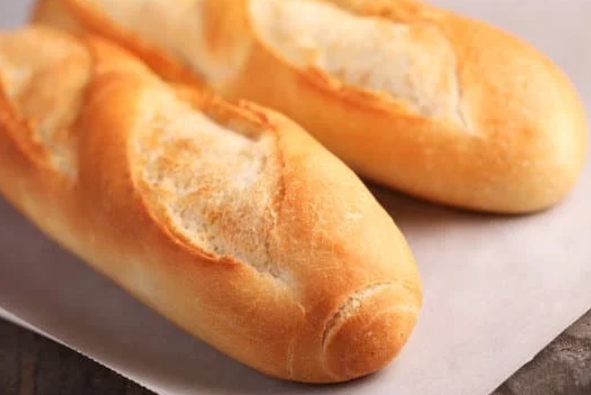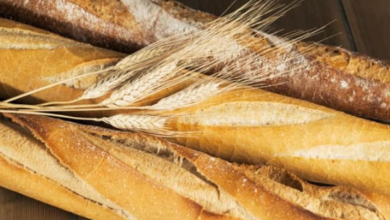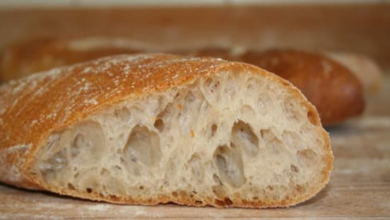Which Flour is Best for Baguettes? We Asked a Baker for the Answer

What To Know
- Higher protein flours produce a stronger dough, resulting in a crispier crust and a more open crumb.
- For baguettes, a flour with a moderate absorption rate is preferred, allowing for a dough that is easy to handle and shape.
- An organic bread flour that is ideal for baguettes, delivering a rustic flavor and a well-rounded texture.
Baguettes, the epitome of French bread, are renowned for their crispy crust, airy crumb, and distinctive flavor. Achieving this culinary masterpiece requires careful consideration of various factors, including the choice of flour. Navigating the diverse world of flours can be daunting, leaving bakers wondering: “Which flour is best for baguettes?” This comprehensive guide will delve into the intricacies of flour selection, providing bakers with the knowledge to craft exceptional baguettes.
Understanding Flour Types and Their Impact on Baguettes
Flour, the foundation of bread, comes in a myriad of types, each possessing unique characteristics that influence the final product. The two primary categories of flour are:
1. All-Purpose Flour:
- A versatile flour suitable for a wide range of baking applications, including baguettes.
- Typically contains a moderate protein content, ranging from 9% to 11%.
- Produces a soft, tender crumb with a slightly chewy texture.
2. Bread Flour:
- Specifically designed for bread making, including baguettes.
- Contains a higher protein content, typically ranging from 11% to 13%.
- Produces a strong, elastic dough that can withstand long fermentation times, resulting in a well-developed flavor and a crispy crust.
Choosing the Ideal Flour for Baguettes
The choice of flour for baguettes depends on several factors, including the desired outcome, the baker’s skill level, and the available equipment.
1. Protein Content:
- Protein content plays a crucial role in determining the texture and structure of baguettes.
- Higher protein flours produce a stronger dough, resulting in a crispier crust and a more open crumb.
- For baguettes, a flour with a protein content of 11% to 13% is generally recommended.
2. Gluten Development:
- Gluten, a protein complex found in wheat flour, is responsible for the elasticity and structure of dough.
- Proper gluten development is essential for achieving a well-risen baguette with a chewy crumb.
- Flours with a higher protein content tend to develop gluten more easily, making them ideal for baguettes.
3. Absorption Rate:
- The absorption rate of flour refers to its ability to absorb water.
- Different flours have different absorption rates, affecting the hydration level of the dough.
- For baguettes, a flour with a moderate absorption rate is preferred, allowing for a dough that is easy to handle and shape.
4. Flavor and Aroma:
- The type of flour can also influence the flavor and aroma of baguettes.
- Whole wheat flour, for example, imparts a nutty, earthy flavor, while bread flour produces a more pronounced wheat flavor.
- Bakers should experiment with different flours to find the one that best suits their taste preferences.
Additional Considerations for Selecting Flour for Baguettes
Beyond the primary factors mentioned above, several additional considerations can influence the choice of flour for baguettes:
1. Freshness:
- Fresh flour produces better results, as it contains more active enzymes and proteins.
- Old flour can lead to dense, crumbly baguettes with a lack of flavor.
2. Storage:
- Flour should be stored in a cool, dry place to maintain its quality and prevent spoilage.
- Exposure to heat, moisture, and pests can compromise the flour’s integrity.
3. Brand:
- Different brands of flour may have slight variations in their characteristics, even if they have similar protein content and specifications.
- Bakers may need to experiment with different brands to find the one that consistently produces the best results.
Recommended Flours for Baguettes
Based on the aforementioned factors, the following flours are commonly recommended for making baguettes:
1. King Arthur Bread Flour:
- A popular choice among bakers, known for its high protein content and consistent performance.
- Produces baguettes with a crispy crust, airy crumb, and well-developed flavor.
2. Bob’s Red Mill Artisan Bread Flour:
- Another excellent option for baguettes, offering a high protein content and a strong gluten structure.
- Results in baguettes with a chewy texture and a golden-brown crust.
3. Central Milling Organic Unbleached Bread Flour:
- An organic bread flour that is ideal for baguettes, delivering a rustic flavor and a well-rounded texture.
- Produces baguettes with a slightly tangy flavor and a crispy crust.
Beyond Flour: Other Factors Affecting Baguette Quality
While flour plays a crucial role in determining the quality of baguettes, several other factors also contribute to the final outcome:
1. Hydration:
- The amount of water in the dough significantly impacts the texture and structure of baguettes.
- Proper hydration is essential for achieving a well-balanced baguette with a crispy crust and a chewy crumb.
2. Fermentation:
- The fermentation process allows the dough to develop flavor and rise properly.
- Controlled fermentation is crucial for producing baguettes with a complex flavor profile and an open crumb.
3. Shaping and Scoring:
- Shaping the dough into the characteristic baguette shape and scoring the surface before baking are essential steps for achieving the desired crust and crumb structure.
- Proper shaping and scoring techniques contribute to the overall visual appeal and texture of baguettes.
4. Baking:
- Baking baguettes at the right temperature and for the appropriate duration is essential for achieving the desired crust color and texture.
- Over-baking can result in a dry, crumbly baguette, while under-baking can lead to a soft, undercooked product.
The Final Touch: Enjoying Your Homemade Baguettes
With careful consideration of flour selection and attention to detail throughout the baking process, bakers can create exceptional baguettes that rival those found in artisanal bakeries. The reward for all this effort is the satisfaction of enjoying fresh, crispy baguettes, perfect for sandwiches, appetizers, or simply savoring on their own.
Beyond Conclusion: Flourishing with Baguettes
The journey to mastering baguettes is an ongoing process, filled with experimentation, learning, and refinement. As bakers continue to explore different flours, techniques, and recipes, they will discover new ways to create baguettes that are both visually stunning and bursting with flavor. The possibilities are endless, and the rewards are delicious.
FAQs:
1. Q: Can I use all-purpose flour for baguettes?
- A: All-purpose flour can be used for baguettes, but it may not produce the same crispy crust and airy crumb as bread flour.
2. Q: How do I know if my flour is fresh?
- A: Fresh flour should have a slightly sweet smell and a fine texture. Avoid flour that has a musty odor or feels lumpy.
3. Q: How can I improve the flavor of my baguettes?
- A: Experiment with different flours, fermentation times, and baking techniques to find the combination that produces the flavor profile you prefer.





